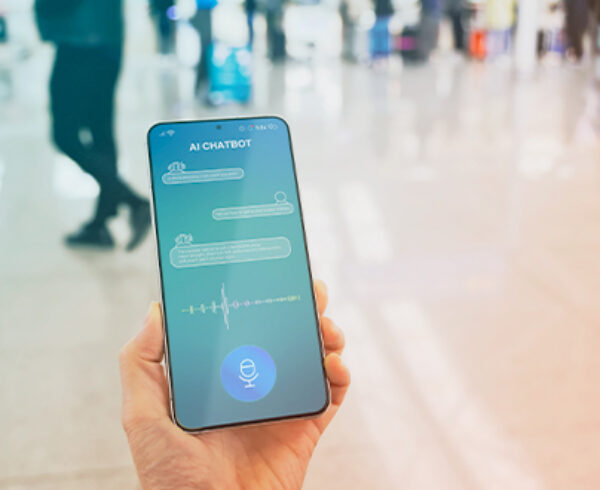Whether you use it to outline a book, cheat on your homework, write your marriage vows or any of the other myriad ways that folks are saying they’re using ChatGPT, it’s clear that AI is poised to change many an industry — and AI will change business travel, too.
ChatGPT is receiving a ton of media attention, with some saying that the tool is a revolutionary piece of tech that will make lots of jobs easier and some obsolete, and others saying that the tool comes with an array of legal concerns, as it’s widely known to plagiarize or produce flat-out falsehoods.
Whatever side of the argument that you fall on, though, you might want to get ready if you’re a Travel Manager because AI — and ChatGPT specifically — is predicted to change business travel in more ways than one. It’s already changing leisure travel, as one CNBC article detailed. From helping you book on a travel deal aggregator’s website to answering questions about travel experiences to helping plan the perfect itinerary, leisure travelers are loving how AI is making their travel planning processes — and the travel experience in general — easier.
But you’re not likely booking your business travelers’ trips on a travel deal aggregator website and you likely don’t need any advice on putting together the perfect leisure itinerary; so how will ChatGPT change your experience as a Travel Manager?
Here are seven ways AI is expected to change the way we travel for work.

1. AI could act as a virtual travel assistant.
If you sometimes feel as if you’re acting more like a virtual assistant to your travelers than you are a Travel Manager. You might find that AI removes part of this VA-type work from your job, acting as a virtual travel assistant in your stead.
All those questions about itineraries, flights and other concerns can be addressed by AI first, for less time wasted on your end plus in-the-moment responses for your travelers and even budget savings, as you’ll be freed up to focus on the more important, profitable parts of your job.
2. AI could help with RFPs and contracts.
If your most-dreaded part of your job is putting together RFPs or reading through lengthy contracts, AI tools may be able to help with that, too, suggesting language for both and summarizing complex documents that might take ages to read through otherwise.
3. AI could analyze your data.
Just like AI can sift through your contracts and similar documents to produce a summary of what you would otherwise need to read and analyze yourself, AI can also do the same with your data. Feed it information on your business travel spending and traveler habits and it can give you a summary of the data you’re looking for — freeing you up to do other work. (Going beyond this, ChatGPT can even make policy change recommendations based on your data!)
4. AI could better ensure compliance.
If you’re struggling with getting your business travelers to actually comply with your business travel policies. You may find that AI can act as one more step in the travel planning and booking process to ensure compliance. If ChatGPT is aware of your policy and looks at a certain travel plan or itinerary, it can quickly and easily flag it as compliant or non-compliant — leaving the guesswork out of your travelers’ booking process.

5. AI could help you better communicate with your travelers.
As a travel manager, you have to communicate with your travelers frequently regarding travel policies, spending and other important details. If you don’t have time to sit down and draft a lengthy email, ChatGPT could do it for you, leaving the only things left for you to do as a quick edit and proofreading to ensure accuracy.
6. AI could help you better understand existing travel trends.
Not sure what you need to know about the latest business travel or travel-related trends, software, legislation or anything in between? Don’t have time to sift through dozens of articles on the subject?
You can ask ChatGPT to explain whatever it is to you in a way that makes the most sense based on your questions and personal experience.

7. AI could help you better serve younger travelers.
Whereas many older business travelers preferred more hands-on attention and service, younger travelers are more apt to prefer in-the-moment, quick, at-their-fingers attention, no matter where they’re getting it from. In these instances, AI could help you better appeal to younger travelers with needs and preferences that differ from those of their predecessors.
The Downsides to AI like ChatGPT and Travel
While all of the above are possibilities and potential ways that AI will change business travel and Travel Managers’ jobs for the better, it’s worth noting that tools like these do still have a long way to go. They’re far from perfect, as one Business Travel News article highlighted when detailing the benefits of AI in business travel (with several of the publication’s predictions overlapping with our own).
ChatGPT and similar tools often don’t typically provide in-the-moment, real-time information, which can be important when it comes to keeping business travelers on schedule or safe. Likewise, as mentioned above, ChatGPT is known to produce factual errors and inaccuracies, as it’s still learning.
Because of this and similar issues, using ChatGPT does still require a human touch. If you use it to create an itinerary, for example, you may still need to double-check that all the information that the AI tool spat out is, in fact, correct. Check everything from noting whether or not a hotel actually exists in your business traveler’s destination to double-checking restaurant opening times.
You Still Need That Human Touch — And That’s Where JTB Business Travel Can Help
Unfortunately, as simple and easy (and appealing) as it may sound, you can’t turn over the entirety of your job to the robots just yet. However, when it comes to taking care of your more complex and human-facing tasks, JTB Business Travel can help.














Leave a Comment